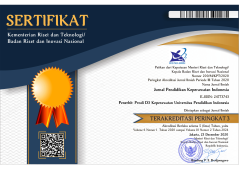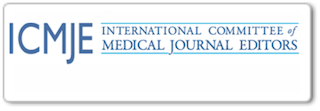Health Education Using Booklet and Diary Media on the Self-Efficacy of Housewives with Hypertension
Abstract
ABSTRACT
Health education is one of intervention strategies in nursing. Optimization in its implementation requires media support, health promotion media that can be used are booklet and diary. Booklet provides more information and diary records daily activities. This research aimed to identify the effect of health education using booklet and diary on the self-efficacy of housewives with hypertension in Depok. This quasi experimental research used pre-post design with control group. The sampling technique used non probability sampling with consecutive sampling method. The total of samples were 66 respondents. Data were collected using an Indonesian version of the High Blood Pressure – Self Care Profile and analyzed using descriptive statistics. The result of independent t test showed significant effect in the mean of self-efficacy value after health education using booklet and diary (p value = 0.002 <0.05). In conclusion, health education using booklet and diary media could increase the self-efficacy of housewives. This health education needs to be applied to clients with hypertension to increase self-efficacy in conducting self-management.
ABSTRAK
Pendidikan kesehatan merupakan salah satu strategi intervensi dalam keperawatan. Optimalisasi dalam pelaksanaannya memerlukan dukungan media, media promosi kesehatan yang dapat digunakan diantaranya adalah booklet dan diary. Booklet memuat lebih banyak informasi dan diary mencatat aktivitas sehari-hari. Tujuan penelitian ini adalah untuk mengidentifikasi pengaruh pendidikan kesehatan menggunakan booklet dan diary terhadap efikasi diri ibu rumah tangga dengan hipertensi di Kota Depok. Penelitian quasi eksperiment ini menggunakan pre-post design with control group. Teknik sampling menggunakan non probability sampling dengan metode consecutive sampling. Total sampel sebanyak 66 responden. Data dikumpulkan menggunakan versi Indonesia High Blood Pressure – Self Care Profile dan dianalisis menggunakan statistik deskriptif. Hasil Independent t test menunjukkan pengaruh signifikan pada rata-rata nilai efikasi diri setelah pendidikan kesehatan menggunakan booklet dan diary (p value= 0,002 < 0,05). Sebagai kesimpulan bahwa pendidikan kesehatan menggunakan booklet dan diary dapat meningkatkan efikasi diri ibu rumah tangga. Pendidikan kesehatan ini perlu diterapkan pada klien dengan hipertensi untuk meningkatkan keyakinan diri dalam melakukan manajemen diri.
Keywords
Full Text:
PDFReferences
Adawiyani R. (2013). Jurnal Ilmiah Mahasiswa Universitas Surabaya. Jurnal Ilmiah Mahasiswa Universitas Surabaya, 2(2), 1 – 20–21 – 20. Retrieved from http://www.journal.ubaya.ac.id/index.php/jimus/article/view/725
Alvarez, C., Greene, J., Hibbard, J., & Overton, V. (2016). The role of primary care providers in patient activation and engagement in self-management: A cross-sectional analysis. BMC Health Services Research, 16(1), 1–8. https://doi.org/10.1186/s12913-016-1328-3
Astuti, N. (2016). Efikasi Diri Dan Manajemen Diri Pada Pasien Diabetes Tipe 2, 5(1), 13–18. Retrieved from http://repository.usu.ac.id/handle/123456789/44550
Bandura, A. (2015). Cultivate Self-efficacy for Personal and Organizational Effectiveness. (E. A. Locke, Ed.), Handbook of Principles of Organizational Behavior (First). West Sussex: John Wiley & Sons, Ltd. https://doi.org/10.1002/9781119206422.ch6
Bandura, A. (2016). Moral Disengagement (First). New York Plaza: Worth Publishers.
Bandura, A., Caprara, G. V., Barbaranelli, C., Regalia, C., & Scabini, E. (2011). Impact of family efficacy beliefs on quality of family functioning and satisfaction with family life. Applied Psychology, 60(3), 421–448. https://doi.org/10.1111/j.1464-0597.2010.00442.x
Barak, F., Amoyal, M., & Kalichman, L. (2013). Using a simple diary for management of nausea and vomiting during chemotherapy. Clinical Journal of Oncology Nursing, 17(5), 479–481. https://doi.org/10.1188/13.CJON.479-481
Barma, R. S., & Sil, P. (2013). A comparative study of health and nutritional status among housewives and working women of north bengal 1. International Journal of Behavioral Social and Movement Sciences, 02(04), 35–40.
Bonsaksen, T., Lerdal, A., & Fagermoen, M. S. (2012). Factors associated with self-efficacy in persons with chronic illness. Scandinavian Journal of Psychology, 53(4), 333–339. https://doi.org/10.1111/j.1467-9450.2012.00959.x
Cucu-Oancea, O. (2013). Using Diaries - A Real Challenge for the Social Scientist. Procedia - Social and Behavioral Sciences, 92(Lumen), 231–238. https://doi.org/10.1016/j.sbspro.2013.08.665
Daniali, S., Shahnaz, H., Kazemi, S., & Marzbani, E. (2016). The Effect of Educational Intervention on Knowledge and Self-efficacy for Pain Control in Patients with Multiple Sclerosis. Materia Socio Medica, 28(4), 283. https://doi.org/10.5455/msm.2016.28.283-287
Direktorat PPTM, D. P. & P. (2006). Pedoman Teknis Penemuan dan Tatalaksana Penyakit Hipertensi. Jakar. https://doi.org/10.1017/CBO9781107415324.004
Dodt, R. C. M., Ferreira, Á. M. V., do Nascimento, L. A., Macêdo, A. C., Joventino, E. S.,
& Ximenes, L. B. (2013). Influence of health education strategy mediated by a self-efficacy breastfeeding serial album. Texto e Contexto Enfermagem, 22(3), 610–618. https://doi.org/10.1590/S0104-07072013000300006
Fitriani, A. (2012). Kondisi Sosial Ekonomi dan Stres pada Wanita Hipertensi Anggota Majelis Taklim. Kesmas: National Public Health Journal, 7(5), 214. https://doi.org/10.21109/kesmas.v7i5.43
Gunthert, Kathleen C, Susan J, wenze. (2014). Daily Diary Methods. In C. Mehl, Matthias R; Tamlin S (Ed.), Handbook of Research Methods for Studying Daily Life (pp. 1–706). New York: The Guilford Press.
Han, H. R., Lee, H., Commodore-Mensah, Y., & Kim, M. (2014). Development and validation of the hypertension self-care profile: A practical tool to measure hypertension self-care. Journal of Cardiovascular Nursing, 29(3), 1–16. https://doi.org/10.1097/JCN.0b013e3182a3fd46
Hemmati Maslakpak, M., & Raiesi, Z. (2014). Effect of a Self-Management and Follow-Up Program on Self-Efficacy in Patients With Multiple Sclerosis: A Randomized Clinical Trial. Nursing and Midwifery Studies, 3(4). https://doi.org/10.17795/nmsjournal25661
Ircham Machfoedz; Eko Suryani. (2013). Pendidikan Kesehatan Bagian dari Promosi Kesehatan (9th ed.). Yogyakarta: Fitramaya.
Kemenkes RI. (2012). buletin-ptm.pdf. Jakarta.
Kemenkes RI. (2013). Riset Kesehatan Dasar. Kementrian Kesehatan RI, (1), 1–303. https://doi.org/10.1007/s13398-014-0173-7.2
Kemenkes RI. (2014). Situasi Kesehatan Jantung. Pusat Data Dan Informasi Kementerian Kesehatan RI, 1–8. https://doi.org/10.1017/CBO9781107415324.004
Kementerian Kesehatan RI. (2012). Petunjuk Teknis Pos Pembinaan Terpadu Penyakit Tidak Menular (Posbindu PTM). Ditjen Pengendalian Penyakit Dan Penyehatan Lingkungan, Kementerian Kesehatan RI, 1–39. Retrieved from http://p2ptm.kemkes.go.id/uploads/2016/10/Petunjuk-Teknis-Pos-Pembinaan-Terpadu-Penyakit-Tidak-Menular-POSBINDU-PTM-2013.pdf
Ketelle, D. (2012). Talking to Myself : Diary as a Record of Life Process Mills College. International Journal of Humanities and Social Science, 2(7), 34–40.
Khalesi, S., Sharma, S., Irwin, C., & Sun, J. (2016). Dietary patterns, nutrition knowledge and lifestyle: Associations with blood pressure in a sample of Australian adults (the Food BP study). Journal of Human Hypertension, 30(10), 581–590. https://doi.org/10.1038/jhh.2016.22
Khoiriyyah, A., & Ediati, A. (2015). Pengaruh Buku Harian untuk Meningkatkan Kepatuhan Pada Pasien Hipertensi: Studi Kuasi Eksperimen pada Pasien Hipertensi. Empati, 4(1), 35–42.
Kristjánsdóttir, Ó. B., Fors, E. A., Eide, E., Finset, A., Stensrud, T. L., Van Dulmen, S., … Eide, H. (2013). A smartphone-based intervention with diaries and therapist feedback to reduce catastrophizing and increase functioning in women with chronic widespread pain. part 2: 11-Month follow-up results of a randomized trial. Journal of Medical Internet Research, 15(3), 1–19. https://doi.org/10.2196/jmir.2442
Kusuma Kelana, D. (2011). Panduan Panduan Melaksanakan dan Menerapkan Hasil Penelitian. Metodologi Penelitian Keperawatan.
Mardhiah, Ainal;Abdullah, A. H. (2016). Pendidikan Kesehatan Dalam Peningkatan Pengetahuan, Sikap Dan Keterampilan Keluarga Dengan Hipertensi - Pilot Study. Jurnal Ilmu Keperawatan, 3(2).
Moein, M., Aghajani, M., Ajorpaz, N. M., & Khorasanifar, L. (2017). Effect of an empowerment program on self-efficacy of patients with type 2 diabetes. Iranian Red Crescent Medical Journal, 19(1), 1–7. https://doi.org/10.5812/ircmj.29252
Nies, M. A., Mcewen, M., Cassells, H., & Miskovich, L. M. (2011). Community / Public Health Nursing : Promoting the Health of Populations 5th Edition Chapter 5 Epidemiology.
Notoatmodjo, S. (2012). Promosi Kesehatan dan Perilaku Kesehatan (Edisi Revisi : 2010). Jakarta, Indonesia: Rineka Cipta.
P.D, S. (2014). Metode penelitian pendidikan pendekatan kuantitatif.pdf. Metode Penelitian Pendidikan Pendekatan Kuantitatif, Kualitatif Dan R&D.
Pangaribuan, L., Dina, D., & Lolong, B. (2015). Hubungan Penggunaan Kontrasepsi Pil Dengan Kejadian Hipertensi Pada Wanita Usia 15-49 Tahun Di Indonesia Tahun 2013 (Analisis Data Riskesdas 2013) Relationship Between Pill Contraceptive Use and Hypertension in Women Aged 15-49 Years: Indonesia 2013 (Furt. Media Litbangkes, 25, 1–8. Retrieved from http://ejournal.litbang.kemkes.go.id/index.php/MPK/article/viewFile/4233/3961
Pichayapinyo, P., Kaewpan, W., & Taechaboonsermsak, P. (2012). Effect of personal health record booklet (PHRB) to knowledge, self-efficacy and healthy behaviors among Thai population at risk of cardiovascular disease (CVD). Journal of the Medical Association of Thailand, 95(SUPPL 6), 48–55.
polit, Denise F & Beck, C. T. (2014). Essentials of Nursing Research Appraising Evidence for Nursing Practice (8th ed.). St. Philadelphia: Lippincott Williams & Wilkins.
Potter, P. A., Perry, A. G., Stockert, P., Hall, A., & Peterson, V. (2013). Clinical Companion for Fundamentals of Nursing.
Pratita, N. D. (2012). Hubungan Dukungan Pasangan dan Health Locus of Control dengan Kepatuhan dalam menjalani Proses Pengobatan pada Penderita Diabetes Mellitus Tipe 2. Jurnal Ilmiah Mahasiswa Universitas Surabaya, 1(1), 24. Retrieved from https://journal.ubaya.ac.id/index.php/jimus/article/view/56
Putri, K. A. K., & Sudhana, H. (2013). Perbedaan Tingkat Stres Pada Ibu Rumah Tangga yang Menggunakan dan Tidak Menggunakan Pembantu Rumah Tangga. Jurnal Psikologi Udayana, 1(1), 94–105.
Rachmawati, P. D., Ranuh, R., & Arief, Y. (2016). Model Pengembangan Perilaku Ibu Dalam Pemenuhan Kebutuhan Asah, Asih Dan Asuh Anak Leukemia. Jurnal NERS, 11(1), 63. https://doi.org/10.20473/jn.v11i12016.63-72
Rina Al-Kahfi; Adriana Palimbo; Marlina. (2016). Pengaruh Efikasi Diri Dan Dukungan Keluarga terhadap Pencegahan Kaki Diabetik Pada Pasien Rawat Jalan Diabetes Mellitus Tipe 2 Di RSUD Dr. H. Moch. Ansari Saleh Banjarmasin. Dinamika Kesehatan, 7(2), 332–346.
Sastroasmoro, S., & Ismael, S. (2014). Dasar-Dasar Metodologi Klinis Edisi Ke-4. In Dasar-Dasar Metodologi Peneltian Klinis. https://doi.org/10.15294/UJPH.V2I1.3034
Sugiyono. (2011). Metode Penelitian Kombinasi (Mixed Methods). Bandung: Alfabeta. https://doi.org/10.1016/S0969-4765(04)00066-9
Tamanna, M. K. (2016). Consumers ’ Interest in Fast Food Items- A Study on Sylhet City of Bangladesh. The International Journal of Business & Management, 4(3), 315–320.
Ünsal, A., & Kaşıkçı, M. K. (2010). Effect of Education on Perceived Self-Efficacy for Individuals with Arthritis. International Journal of Caring Sciences, 3(1), 3–11.
Urzi, D., Stapleton, P., & Chatwin, H. (2016). The use of a daily diary system to promote self- monitoring and improve health-related identity and self-efficacy. Graduate Journal of Sport, Exercise & Physical Education Research, 4, 14–28. Retrieved from http://epublications.bond.edu.au/cgi/viewcontent.cgi?article=1527&context=fsd_papers
Wahyuni, A., Nurrachmah, E., & Gayatri, D. (2012). Kesiapan pulang Pasien Penyakit Jantung Koroner Melalui Penerapan Discharge Planning. Jurnal Keperawatan Indonesia, 15(3), 151–158. https://doi.org/10.7454/jki.v15i3.3
Wahyuni, A., & Rezkiki, F. (2015). Pemberdayaan dan Efikasi Diri Pasien Penyakit Jantung Koroner melalui Edukasi Kesehatan Terstruktur. Jurnal Ipteks Terapan, 9(1), 28–39. https://doi.org/10.22216/jit.2015.v9i1.26
Wayunah, Saefulloh, M., & Nuraeni, W. (2016). Efficacy dan Menurunkan IDWG Pasien Hemodialisa. Jurnal Pendidikan Keperawatan Indonesia, 2(1), 22–28.
Weibull, F., Cumming, J., Cooley, S. J., Williams, S. E., & Burns, V. E. (2015). Walk this Way: A Brief Exercise Imagery Intervention Increases Barrier Self-Efficacy in Women. Current Psychology, 34(2), 477–490. https://doi.org/10.1007/s12144-014-9271-0
WHO. (2013). A global brief on hypertension | A global brief on Hyper tension. Geneva. Retrieved from https://apps.who.int/iris/handle/10665/79059
Woll, H. (2013). Process Diary as Methodological Approach in Longitudinal Phenomenological Research. Indo-Pacific Journal of Phenomenology, 13(2), 1–2. https://doi.org/10.2989/ipjp.2013.13.2.2.1176
DOI: https://doi.org/10.17509/jpki.v6i1.23205
Refbacks
- There are currently no refbacks.
Jurnal Pendidikan Keperawatan Indonesia(JPKI) published by Indonesia University of Education. JPKI is licensed under a Creative Commons Attribution-ShareAlike 4.0 International License.
Office :
Nursing Department. FPOK UPI.
229, Dr. Setiabudhi Street. Bandung 40154
West Java , Indonesia
E-mail : jpki@upi.edu

_.png)
_.png)
_.png)











